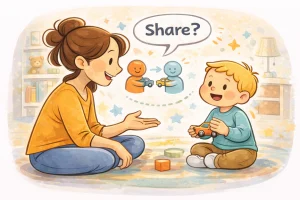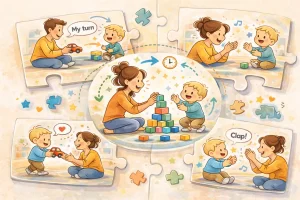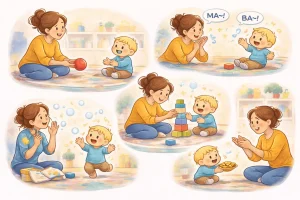Is Your Toddler Talking Yet? 18–24 Month Speech Milestones Checklist
Last Updated: August 5, 2025
Is your toddler between 18 to 24 months and you’re wondering if their speech is on track? You’re not alone. This is a big time for toddler speech development — a stage where first words often turn into short phrases, and babble begins to sound more like conversation. Every child grows at their own pace, but there are certain 18–24 month speech milestones that can help you understand what’s typical at this age. These include things like how many words they say, whether they can follow simple directions, or if they’re starting to combine two words.
Free Speech Help for Kids
Concerned about speech delays? Book a free consultation with our expert speech therapist and get guidance tailored to your child’s needs.
What Are 18–24 Month Speech Milestones?
The toddler years are full of exciting “firsts,” and speech is one of the biggest. Between 18 and 24 months, many children move from single words to simple two-word phrases — and their understanding of language starts to grow quickly.
These 18–24 month speech milestones are a helpful way to track your child’s progress and understand what’s typical at this stage. Keep in mind, though: all toddlers develop at their own pace. Some might say more, some less — and that’s okay! What matters is steady progress over time.
Key Speech Milestones at 18 Months
By around 18 months, many toddlers are beginning to communicate with both words and actions. Here’s what you might notice:
- Uses 5 to 10 simple words like “mama,” “ball,” or “bye-bye”
- Responds to their name when called
- Tries to repeat familiar sounds or words they hear
- Uses gestures such as pointing, waving, or reaching to express needs
Key Speech Milestones at 24 Months
By the time your toddler turns 2, their vocabulary and understanding often take a big leap. Common speech milestones at 24 months include:
- Says at least 50 words (though some may say even more!)
- Begins to combine two words to form phrases like “more juice” or “go car”
- Follows simple instructions such as “Get your shoes” or “Give it to Mama”
- Names familiar people or objects like “dog,” “ball,” or “daddy”
These skills show that your child is not only talking more — they’re also understanding and interacting with the world in new ways.
Why Tracking Toddler Speech Development Matters
Speech and language are the building blocks of how your toddler learns, connects, and explores the world. That’s why keeping an eye on your child’s speech development during the early years is so important — it helps you notice progress and spot any early signs of a speech delay in toddlers.
Some toddlers talk early, while others take a little more time. That’s completely normal. But tracking their milestones — like how many words they use, whether they follow simple directions, or if they try to copy what you say — gives you a clear picture of how things are going.
Why It’s Worth Tracking Speech Milestones
- Catch concerns early: If your toddler isn’t meeting expected milestones, it could be a sign they need extra support.
- Support their learning: Speech skills are closely linked to thinking, playing, and social interaction.
- Boost confidence: Toddlers who feel understood are often more confident and eager to communicate.
- Avoid “wait and see” delays: Acting early makes it easier to close gaps before they grow wider.
When speech issues are spotted early, they’re often easier to support — and progress can happen faster with the right guidance.
Common Signs of a Speech Delay Between 18–24 Months
It’s natural to wonder if your toddler’s speech is on track — especially when other kids the same age may seem to be talking more. While some variation is normal, there are certain signs that may suggest a speech delay in toddlers, and it’s helpful to know what to look for.
Tracking your child’s communication — not just their words, but also how they respond, gesture, and interact — gives you valuable clues about how their speech and language are developing.
When to Worry About Your Toddler’s Speech
Here are some red flags to watch for between 18 and 24 months:
- Not using any words by 18 months
Even simple words like “mama,” “ball,” or “bye” are expected by this age. - Not combining two words by 24 months
By age 2, toddlers often start forming phrases like “want toy” or “more juice.” - Doesn’t respond to sounds or name
Lack of response may signal hearing issues or challenges in processing language. - Uses mostly gestures but few words
Gesturing is a great first step, but words should follow soon after.
These signs don’t always mean something is seriously wrong — but they are strong reasons to seek guidance. The earlier you identify a delay, the easier it is to help your child make progress.
Know more about on “Speech Delay in Toddlers: Signs Every Parent Should Watch For“
Simple Speech Checklist for 18–24 Month Toddlers
Not sure what your toddler “should” be saying by now? Don’t worry — every child is unique, and milestones are just helpful guideposts. This toddler speech checklist makes it easier to track the key language milestones between 18 and 24 months — all in one quick, parent-friendly list.
These signs show your child is on the right track with early communication and speech skills:
Toddler Speech Checklist (18–24 Months)
- Uses words for familiar people and objects
(“Mama,” “dog,” “cup,” or “ball”) - Tries to copy words you say
May repeat parts of words or imitate familiar phrases - Understands simple questions
Like “Where’s your toy?” or “Want milk?” - Begins using action words
Words like “go,” “eat,” “come,” or “stop” - Makes animal or vehicle sounds
Fun sounds like “moo,” “vroom,” or “woof” count as early language too!
How to Help Your Toddler Reach Speech Milestones
If you’re wondering how to help your toddler talk more, you’re already doing something great — paying attention. The good news? You don’t need fancy tools or flashcards. The best toddler speech support often comes from simple, everyday moments.
Here are three easy, parent-approved ways to encourage speech development at home:
Talk More During Daily Routines
Your toddler learns a lot just by hearing you talk — especially when it’s about things they’re doing.
Example: “We’re washing your hands. First water, now soap!”
Mealtime: “Here’s your spoon. Let’s eat rice.”
Describing daily activities builds vocabulary and helps your child connect words with actions. Keep your sentences short, clear, and full of repetition.
Read and Sing Together Daily
Books and songs are powerful tools for language learning. They introduce rhythm, repetition, and fun sounds that toddlers love.
Pick books with simple pictures and repeating phrases
Sing songs like “Twinkle Twinkle” or “Wheels on the Bus” — over and over!
Don’t worry if your child can’t say the words yet. Listening and trying to copy sounds is a big first step.
Limit Screen Time and Encourage Play
Too much screen time can slow down language use, especially when it replaces real interaction. Try to focus on play that involves talking, pointing, and exploring.
Pretend play (like feeding a toy or driving a car) is a great chance to name objects and actions in context.
Example: “Your teddy is hungry. Let’s give him some food!”
The more your child hears real words during real moments, the faster speech tends to grow.
Conclusion
Every child learns to talk at their own pace, but tracking toddler speech milestones helps you know when to give extra support. Don’t wait or worry in silence — early speech development support can make a big difference. Talk, play, read, and keep an eye on your child’s progress. And if you’re not sure what’s normal, you’re not alone. At WellnessHub, we offer expert help, easy tools, and online speech therapy to guide you.
Frequently Asked Questions:
1. What are normal speech milestones for an 18-month-old?
By 18 months, toddlers usually say around 5 to 10 clear words, like “mama,” “dada,” or “ball.” They should be able to understand simple words and show interest in what you say. Many toddlers at this age also start using gestures like pointing, waving, or reaching to get your attention. These are all positive signs of early toddler speech milestones.
2. How many words should a 2-year-old be saying?
By the time your child turns 2, they should be using at least 50 words. Many also begin to put two words together to form small phrases like “want milk” or “go car.” If your toddler is saying fewer than 50 words or not combining any words yet, it may be time to look into speech development support.
3. When should I worry about my toddler’s speech?
It’s okay to be unsure — but there are some clear signs to watch for. If your toddler is not saying any words by 18 months, not putting two words together by 24 months, or not responding to their name, these may be signs of a speech delay in toddlers. The sooner you check in with a speech expert, the better the outcome.
4. What are the signs of a speech delay in toddlers?
Common signs include:
- Not using words by 18 months
- Not combining words by 2 years
- Using gestures more than words
- Not pointing to show interest
- Not following simple directions
If you notice a few of these signs, consider speaking with a professional. You can also use the early speech delay signs checklist from Wellness Hub.
5. Can I help my toddler talk at home?
Yes! You play a big role in helping your toddler talk. Try talking to them during everyday routines — like bath time or meals. Read books with big pictures and simple words. Sing songs with actions like “If You’re Happy and You Know It.” All these activities help build early speech and language skills in a fun way.
6. Does too much screen time affect toddler speech?
Yes, it can. While short videos or songs may seem fun, too much screen time can reduce the face-to-face talking and playing that toddlers need. Real-life talking, listening, and playing are what help toddlers learn to speak. Try to keep screen time limited and focus more on interactive play and conversation.
7. Should I be worried if my toddler only uses gestures?
Gestures like pointing, waving, or nodding are important early signs of communication. But by 24 months, toddlers should also be using a growing list of words. If your child is relying mostly on gestures and not trying to speak, it may be time to get a speech evaluation or start simple speech-building activities.
8. What causes speech delay in toddlers?
Speech delays can happen for many reasons. Some children have hearing problems, others may have developmental delays, and sometimes it’s due to limited social interaction. The good news is that when spotted early, many toddlers can catch up with speech development support. That’s why tracking milestones is so helpful.
9. How do I track my child’s speech milestones?
You can use a simple toddler speech checklist to follow what your child says and understands. Write down new words, note if they’re combining phrases, and observe how they respond to questions. For an easy tool, try the downloadable Speech Tracker from Wellness Hub, made just for parents.
10. Where can I get help if I think my child has a speech delay?
You don’t have to figure it all out alone. A speech-language therapist can assess your child’s needs and guide you with the right support. Wellness Hub offers online speech therapy, milestone trackers, and expert guidance that’s simple, trusted, and designed for families like yours.
About the Author:
Shravanaveena Gajula
M.Sc ., Speech and Language Pathology (5+ years of experience)
Shravanaveena Gajula is a dedicated Speech-Language Pathologist with a BASLP and an M.Sc in Speech and Language Pathology. With experience spanning multiple settings, including Wellness Hub , Veena specializes in a wide range of disorders from developmental issues in children to speech and language assessments in adults. Her expertise includes parent counseling, managing speech sound and fluency disorders, and creating individualized therapy programs. Veena is also PROMPT certified and an author of several insightful blogs on speech and language pathology, aiming to educate and assist caregivers in supporting their loved ones.
Book your Free Consultation Today
Parent/Caregiver Info:
Client’s Details:
* Error Message









